Leakage is the most frequent one among a plethora of reasons that influence a car battery to keep corroding. A chemical reaction in the clamps isn’t uncommon either. Either way, you will not be able to prevent the battery from corrosion after a certain time. It’s just the nature of automotive batteries.
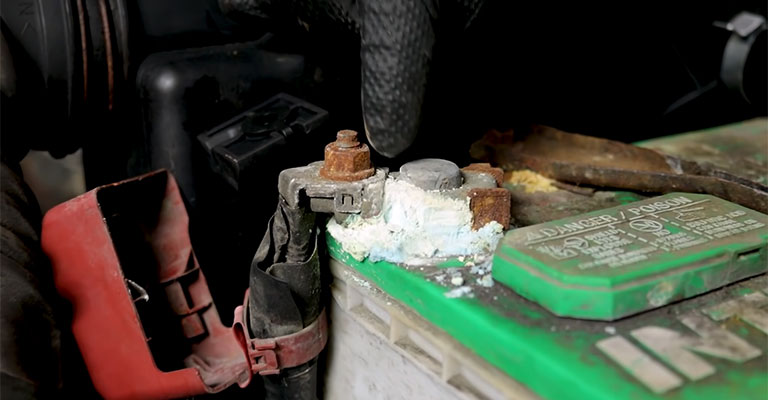
Why Does My Car Battery Keep Corroding?
The battery is a crucial component that affects a car’s functionality and safety. But it is often overlooked in the maintenance schedule until it dies or creates a problem. The most common problem regarding lead-acid batteries used in automobiles is corrosion.
Though the usual reason is corrosive gas and electrolyte leakage, there are other reasons too. Sometimes, it’s just the battery’s age that triggers it to corrode over time.
Corrosive Gas Leak
A typical lead-acid battery uses an electrolyte solution to function. This solution contains a mixture of sulfuric acid and water. A chemical reaction inside the battery causes hydrogen to disintegrate. This hydrogen then leaks through the small opening in the battery casing in form of gas along with the sulfuric acid vapor.
The leaked gases then react with other gases and metals underneath the car’s hood which causes corrosion in the battery terminals. Overcharging and undercharging the battery can boost this process. You can determine the cause sometimes by locating the corrosion area inside the battery.
Overcharged Battery
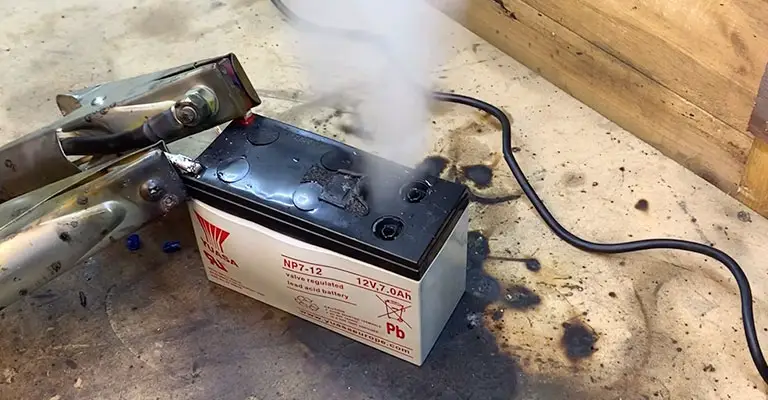
Overcharging your battery can cause corrosion in the battery terminal. When a battery gets overcharged, the inside temperature rises and the electrolyte volume increases. Sometimes, the electrolyte can even start boiling, causing the hydrogen and sulfuric acid vapor to steam through the vents in the battery casing.
These leaked substances cause corrosion in the battery terminal. Corrosion in the positive terminal indicates overcharging of the battery. You can also check the voltage using a multimeter. When revving the engine, the battery shouldn’t charge over 14.5 volts. Charging the battery too frequently can also overcharge the battery.
Undercharged Battery
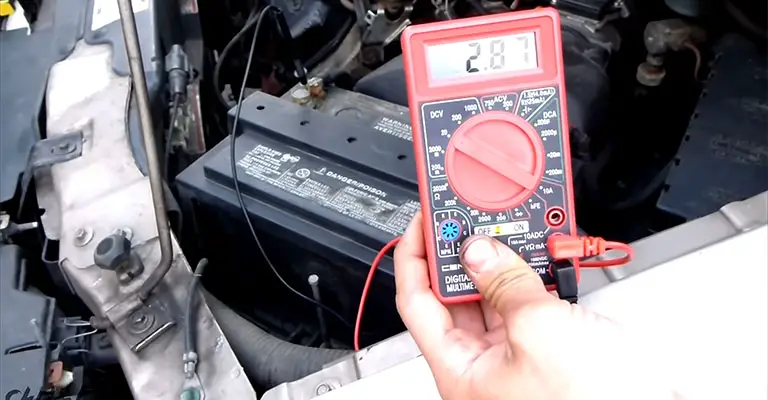
If you see corrosion in the negative terminal, it may indicate that the battery is not being properly charged. This is the most common scenario due to the nature of the batteries. Not charging the battery at necessary intervals throws the battery into an undercharged situation. A faulty regulator can be a potential culprit as well.
Electrolyte Solution Leak
Almost all automotive battery consists of an electrolyte solution. If the electrolyte leaks somehow, it may accumulate on the battery terminal and cause corrosion. An overfilled battery or a damaged battery can be a potential reason behind electrolyte leak.
Overfilled Battery
Some automotive batteries have sealed containers and don’t require maintenance often. These batteries have thin chances of electrolyte leakage. But the rest need to be refilled with distilled water at a few month intervals.
If the battery is overfilled while topping the electrolyte with distilled water, the excess fluid may leak through the vents of the battery and spill out. If the electrolyte comes near the terminals, it will advance the corrosion. This is why you should never fill the battery above the recommended marker.
Damaged Battery
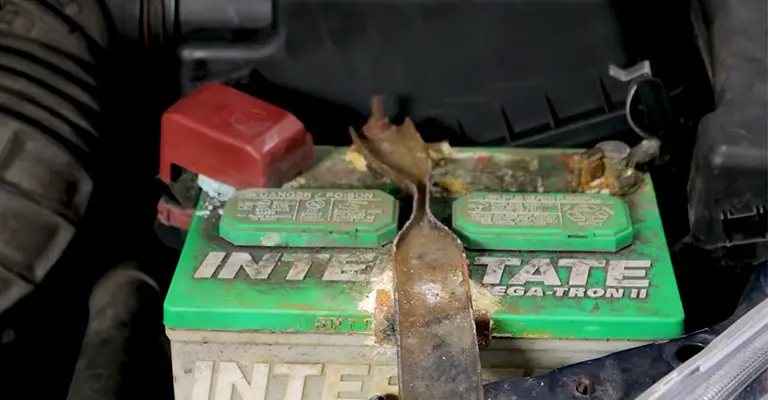
Even if the electrolyte is meant to be inside the secured casing of the battery, any impact or damage to the battery can form a crack in the body. This may cause the electrolyte to spill out. Lack of proper maintenance can be another reason that can cause electrolyte leakage, which may cause corrosion if accumulates near the terminals.
Chemical Reaction on the Clamps
The clamps that connect the wire are made of copper in most cases. Copper is a good conductor of electricity that cannot corrode on its own. But it becomes vulnerable to corrosion when it comes in touch with sulfur under favorable conditions.
Leaking sulfuric acid in liquid or vapor forms stores near the terminals, exposing the copper clamps to sulfur substances. As the electric current flows through the clamps to the wires, it creates a suitable condition for chemical reactions to form copper sulfate. The bluish-green crystals formed around the clamps are the indicator of such corrosion.
Old Battery
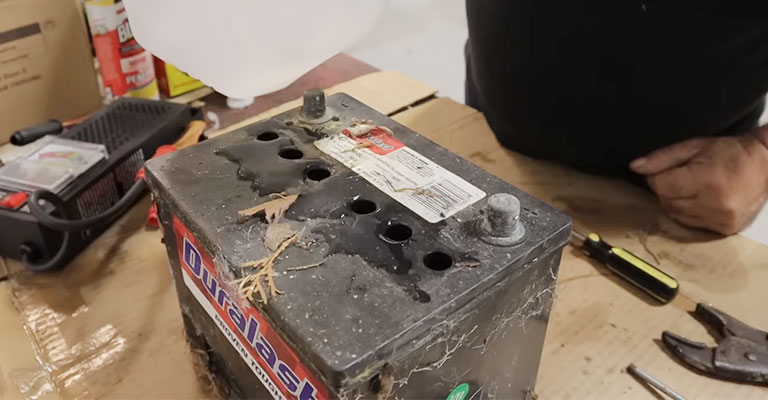
Each battery has a life span of its own. Usually, an automotive battery lasts about three to five years depending on usage and maintenance. After that period, no matter how hard you maintain it, a replacement becomes inevitable.
An old battery loses its ability to hold the charge and the performance drops drastically. The parts continue to corrode until the battery becomes dead for good. Hence, it is important to replace your old battery to get maximum efficiency.
How Do You Fix Battery Corrosion
If the corrosion is in the terminals, which is the most common case, it is easy to fix. But if the corrosion is in any other parts, you shouldn’t mess with it.
Cleaning Terminals With Baking Soda – Water Solution
The best way to remove corrosion from the terminals is to use baking soda–water solution. Here is a step-by-step guide for you:
- First, turn off the car’s ignition.
- Remove the terminals from the battery.
- Make a baking soda–water solution and pour it on the terminals. Use a brush to scrub off the copper sulfate crystal.
- If the corrosion layer is too thick, take the solution to a bowl and soak the terminals in it for 20-30 minutes. Then scrub it with a brush. Change the solution and repeat the process until the terminal is properly cleaned.
- Wash the terminals with water after the cleaning process.
- Let everything dry before you assemble them. You may use a clean cloth to dry them off.
- At last, check the wires, casing, and other components before installing the terminals.
Prevention
You can prevent corrosion in the terminals in the following ways:
- Check and maintain your battery at regular intervals.
- Use anti-corrosion spray on the terminals to form a protective coat on them.
- Use battery terminal washers to absorb the sulfuric acid vapors that escape through the small opening at the base of the ports.
- Use a charger that is compatible with your car’s battery. Also, maintain a proper charging schedule.
- Avoid filling distilled water in the battery above the indicator.
FAQ
1. Does battery corrosion mean I need a new battery?
Answer: In the case of automotive batteries, if corrosion occurs in the terminals of the battery, there is no need to replace it. You can use a baking soda–water solution to fix it. However, if your battery has already passed the lifespan or the corrosion occurs somewhere other than the terminals, it is better to replace it with a new one.
2. Is it safe to drive a car with a corroded battery?
Answer: Corrosion forms over time in automotive batteries due to the chemical composition of the batteries. A little corrosion will not necessarily cause any problems, a thick layer of it can block the electric current passing from the battery to the car. So, it’s very important to prevent corrosion.
3. Does corrosion mean a bad battery?
Answer: A potential reason for corrosion can be damaged or old batteries. However, sometimes, corrosion causes due to human errors, such as lack of maintenance, overcharging or undercharging the battery, etc.
Bottom Line
Even if a little corrosion in the battery will not do any harm, it should not be ignored. Proper maintenance and preventive measures can stop unwanted corrosion and increase the lifespan of the battery.
Leave a Reply